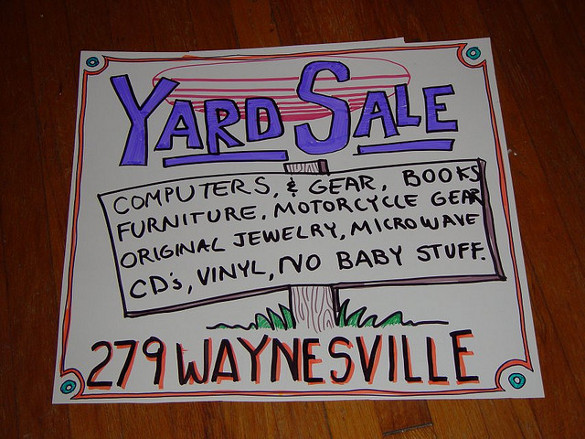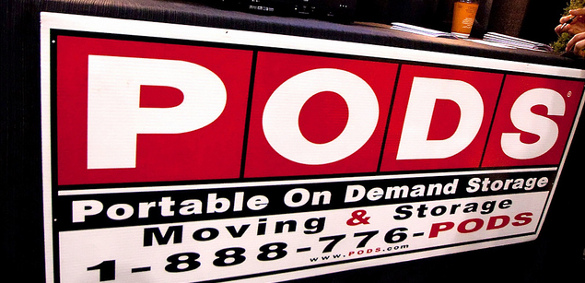
As you sit on your couch basking in all the glory of your trip planning, you start to look around. Suddenly you notice some things. Lots of things. Everywhere.
“Oh, boy!” you say to yourself aloud. “I sure do have a lot of crap here in my house/apartment/condo. What the hell am I going to do with all this stuff?” (Feel free to add in a few more details and expletives to that quote if you have kids!)
Panic starts to set in, but then you realize how far you’ve come over these months (or years) of planning this epic, long-term trip. You can handle this, and while it may seem disheartening at the moment, you can soldier through and figure it out.
[figure title=”Free yourself…” description=”and and make room for new experiences” src=”https://content.bootsnall.com/articles/wp-content/uploads/2013/02/Clutter-2.jpg”]
Getting rid of your crap
Not everything you own is crap. There are plenty of items you do own that get put to good use all the time. As for the other 85% of the stuff in your place, well, a lot of it is crap. Getting used to the idea of throwing stuff out is foreign to so many people from western countries. It’s just part of the culture to collect, collect, collect until your house is filled to the brim.
If you are a traveling family, it’s even worse. Depending on the age(s) of your kid(s) and how many you have, you probably have gobs of toys, clothes, baby stuff, etc. that has been accumulating in your house over the years.
Well now is your chance to start anew. Rectify your clutter problem by getting rid of most of it. If you are moving out completely and putting your stuff in storage, I’m guessing you’d prefer a smaller (and cheaper) storage unit. Even if your parents, siblings, or friends agreed to give you space in their storage room or basement for your extra stuff, it would be nice not to bring truckloads of it.
Even if you are coming back to the same place you live in now, it’s still a good idea to take this opportunity to do some downsizing. You will get used to living with much less over the course of your trip, and when you get home, I assure you that you’ll want to downsize even more. Long-term travel has a way of opening our eyes to things like this, and even your kids will come to the conclusion that they probably had too much crap, so get them in on the fun if you’re a family.
What to do with it all

Some stuff will have to be thrown out or given away. But a good portion of it can be sold. Craig’s List, Ebay, and garage or yard sales are great ways to get rid of stuff that you just don’t use or need anymore. Our culture is obsessed with collecting, so take advantage of other’s hoarding mentality and sell your crap off. Someone out there is surely interested in Aunt Martha’s flowered glass lamp from 1961, and a new or expecting parent will be ecstatic to take all those toys off your hands at a discounted price.
Selling off a lot of your stuff is not only empowering because you’re paring down and learning to live on less (which is what you’ll be doing for the length of your trip), but it can also garner you a good deal of extra funds for your trip or for your nest-egg for your return. Sure, you’re most likely not going to want to get rid of everything, but once you start ditching stuff, it gets addicting.
If you can’t sell it or don’t want to mess with it, then give what’s still in good condition away to charity. Goodwill is always accepting, as are various charities in every city across the world. Obtaining some good karma for yourself before departing is never a bad idea.
Storing your stuff

If you plan on selling your house or you rent, you will need to store some of your stuff. There are countless storage units in every city, so it’s all a matter of shopping around in the city you live. Pods are great and makes the whole process even easier, but it’s more expensive than traditional storage units.
If you have a friend or family member who is kind enough to offer some space in their house, bonus! This provides even more incentive to get rid of as much as you can, as you don’t want to take advantage of someone who is doing you such a huge favor.
What to do with your vehicle(s)
If you own a car, deciding what to do with it can be a difficult decision to make. It depends on a variety of factors, like how old it is, how much it’s worth, and if you own it outright or are still making payments. Whether or not you plan on moving back to the same house and city also impacts your decision on this one.
If your car is an old beater that isn’t really worth much, it might be a good idea to just hold on to it for when you return (unless you don’t plan on returning). If your car is still in good condition and it’s paid off, you may want to sell it as it will just depreciate sitting there while you’re gone. This could give you some extra funds for traveling, or it can go into a nest-egg for a new car when you return.
If you still owe money on your car and can’t get rid of it without losing money, then consider seeing if a friend or family member is looking for something to drive temporarily. Maybe you can work out a deal that benefits both parties, with your friend or family member picking up partial payments while being able to drive your car while you’re gone. You may have to pay some to make it worth their while, but it would be nice to come home to a car after returning. Once less thing you have to worry about when trying to re-enter normal life.
Or if you live in a public transportation friendly city, consider getting rid of your car long before you leave. You can have some extra funds from the sale, and you’ll be saving money by not making car payments and paying for insurance and gas.
The pet dilemma
If you are both a travel lover and a pet lover, this provides a problem. Sometimes you simply have to choose one or the other, as long-term travel doesn’t mesh well with owning pets. It’s something travelers need to keep in mind, as it’s not fair for your furry friends for you to leave for months at a time.
But if you want both, it’s possible, though it’s going to take some work and good friendships to make it happen. The best things for both pet and traveler is to find a friend or family member to take care of your pet(s) while you are gone. This is not easy as asking someone to do this for you is a huge favor. If someone agrees, payment or some other form of thanks is a necessity.
Read Letting Go: What About Pets? for more in depth information for all you animal lovers
Sometimes it just doesn’t work out, unfortunately, and you may be forced to give your pets away. It’s heartbreaking and no one wants to do it, but there are plenty of people out there looking for a pet who would provide a great home. And honestly, it will be much easier on your pet to adjust. Probably way more than you.
Check out the following articles and resources to learn more about getting rid of your stuff:
- Ready, Set, Sell, Fundraise
- Getting Rid of It: Eliminating the Clutter in Your Life
- The Joy of Less
- What Happens to Your Stuff When You’re Traveling?
- Did You Sell Everything to Fund Your Trip?
- How to Get Rid of All Your Crap
What To Do With All Your Stuff While You’re Gone Checklist
- Start assessing all your possessions
- Begin making lists -1) Definitely get rid of -2)Definitely keep -3)Maybe
- Start listing things you can sell on Craig’s List and/or Ebay
- Have a garage/yard sale
- Give away things you can’t sell to Goodwill or other charities in your city
- If you own, make a decision on renting or selling
- If renting, try to find a friend or family member to rent it from you first
- If renting to a friend or family member, try working out a deal to have them store some of your stuff while gone
- If selling, research storage options in your city
- Do you have any friends/family members that have extra space for your stuff?
- Make a decision about your car – 1)Sell -2)Keep -3)Rent to a friend/family member
- If you have a pet, try to find a friend/family member to watch him or her
- If not, find a good home for your pet